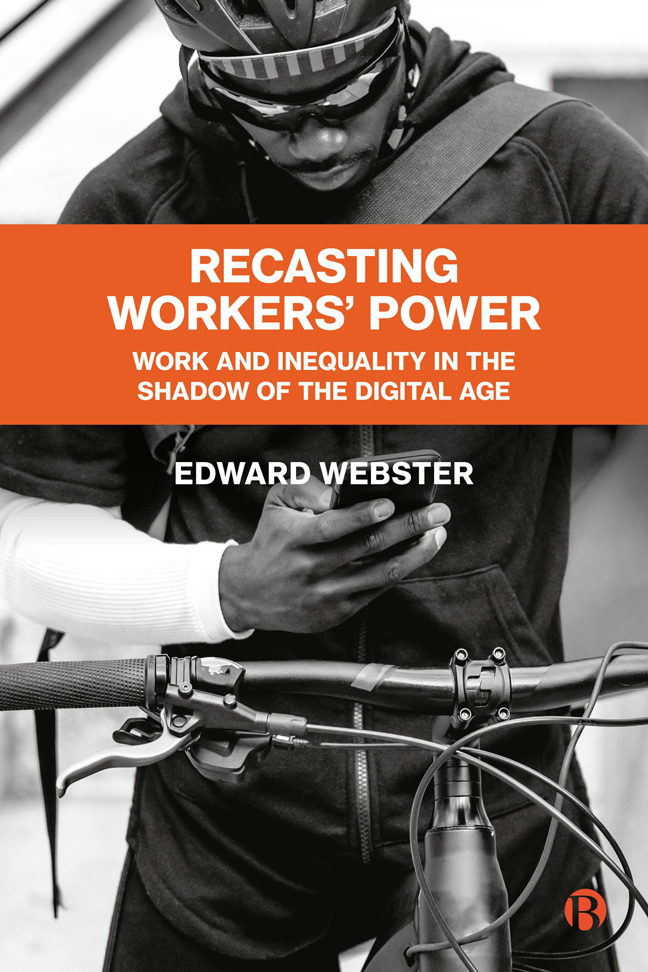Book contents
- Frontmatter
- Contents
- List of Figures and Tables
- List of Abbreviations
- Preface
- 1 The End of Labour? Rethinking the Labour Question in the Digital Age
- 2 Precarious Work after Apartheid: Experimenting with Alternative Forms of Representation in the Informal Sector
- 3 Neo-liberalism Comes to Johannesburg: Changing the Rules of the Game
- 4 Divided Workers, Divided Struggles: Entrenching Dualisation and the Struggle for Equalisation in South Africa's Manufacturing Sector
- 5 Authoritarian Algorithmic Management: The Double-edged Sword of the Gig Economies
- 6 Crossing the Divide: Informal Workers and Trade Unions
- 7 Global Capital, Global Labour: The Possibilities of Transnational Activism
- 8 Changing Sources of Power and the Future of Southern Labour
- Index
5 - Authoritarian Algorithmic Management: The Double-edged Sword of the Gig Economies
Published online by Cambridge University Press: 23 January 2024
- Frontmatter
- Contents
- List of Figures and Tables
- List of Abbreviations
- Preface
- 1 The End of Labour? Rethinking the Labour Question in the Digital Age
- 2 Precarious Work after Apartheid: Experimenting with Alternative Forms of Representation in the Informal Sector
- 3 Neo-liberalism Comes to Johannesburg: Changing the Rules of the Game
- 4 Divided Workers, Divided Struggles: Entrenching Dualisation and the Struggle for Equalisation in South Africa's Manufacturing Sector
- 5 Authoritarian Algorithmic Management: The Double-edged Sword of the Gig Economies
- 6 Crossing the Divide: Informal Workers and Trade Unions
- 7 Global Capital, Global Labour: The Possibilities of Transnational Activism
- 8 Changing Sources of Power and the Future of Southern Labour
- Index
Summary
In this chapter we look at location-based platforms, in the period 2019–2022. Their use has increased significantly since their first entry into Africa in 2016. We focus specifically on the rider-hailing sector in Johannesburg, which we will refer to as food courier delivery riders. We draw much of the data in this chapter from our research report titled ‘I just want to survive: a comparative study of food courier riders in three African cities’ (Webster and Masikane, 2021). That report points to the emergence of a new type of worker in the digital economy, who is subject to a new business model based on a form of authoritarian algorithmic management.
This new form of work is controlled by a few corporations, popularly known as tech giants, such as Uber and Amazon. Promising freedom, flexibility, self-employment, and shared business ownership (SBO), these multinational tech conglomerates claim to be creating new economic opportunities in Africa. In reality, as is evident from our study, these opportunities are predicated on precarious work, deepening worker insecurity, undermining worker rights, and increasing inequality between extremely wealthy senior managers and a growing reserve of precarious workers. These forms of control make management figures invisible, as they become hidden and inaccessible. Nevertheless, by technologically linking riders together, companies have increased workers’ bargaining power, opening the possibility of riders exercising structural, associational, and societal power.
We begin by discussing the rise of platform capitalism and the platform labour process, and how the rider-hailing sector entered Africa. We then look at who the food courier riders are, in order to understand the nature of this type of work, drawing from the findings of the research report. We have found in our research among food courier riders that despite the individualisation, dispersal and pervasive monitoring that characterises work in the ‘gig economy’ – that is, short-term freelance work where digital platforms connect freelancers with customers or clients (ILO, 2021) – digital technology is generating forms of counter-mobilisation. By technologically linking platform workers, the gig economy tends to link their working bargaining power, thus contributing to the emergence of self-organised, hybrid forms of union-like associations (associational power) and new partnerships with traditional unions and NGOs (societal power). The chapter concludes by suggesting that the new digital technology is a double-edged sword.
- Type
- Chapter
- Information
- Recasting Workers' PowerWork and Inequality in the Shadow of the Digital Age, pp. 101 - 124Publisher: Bristol University PressPrint publication year: 2023

